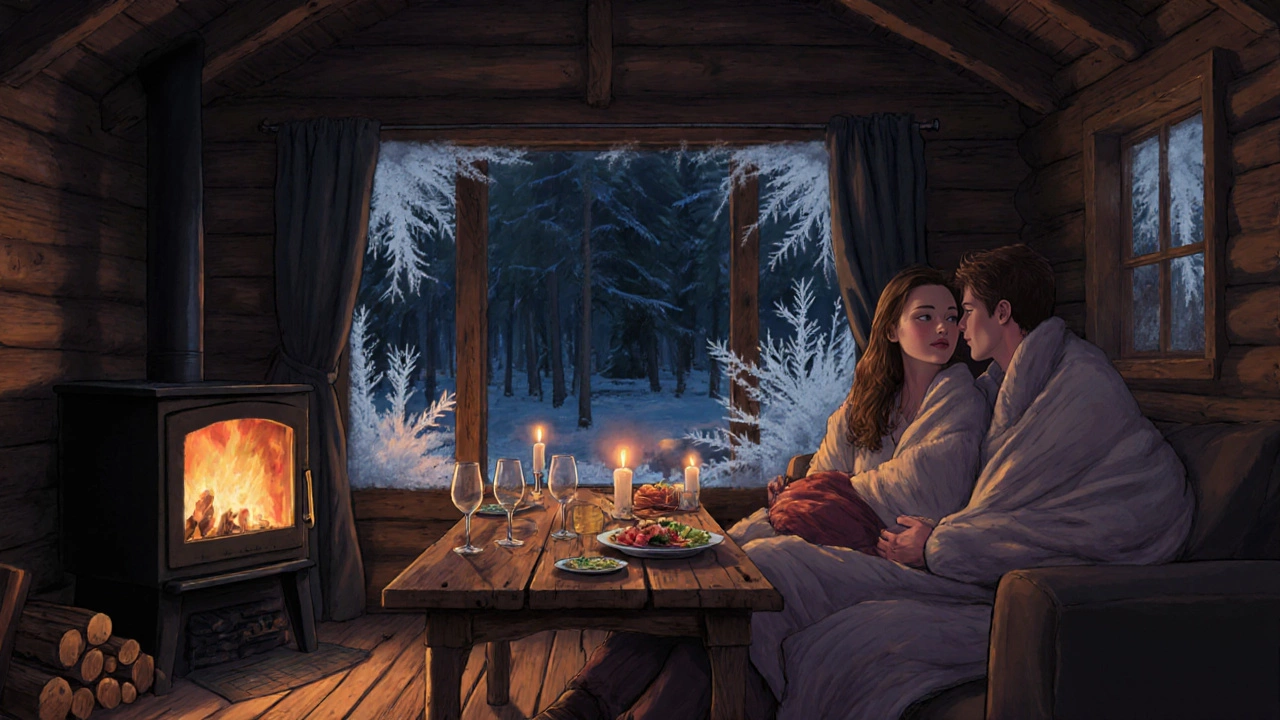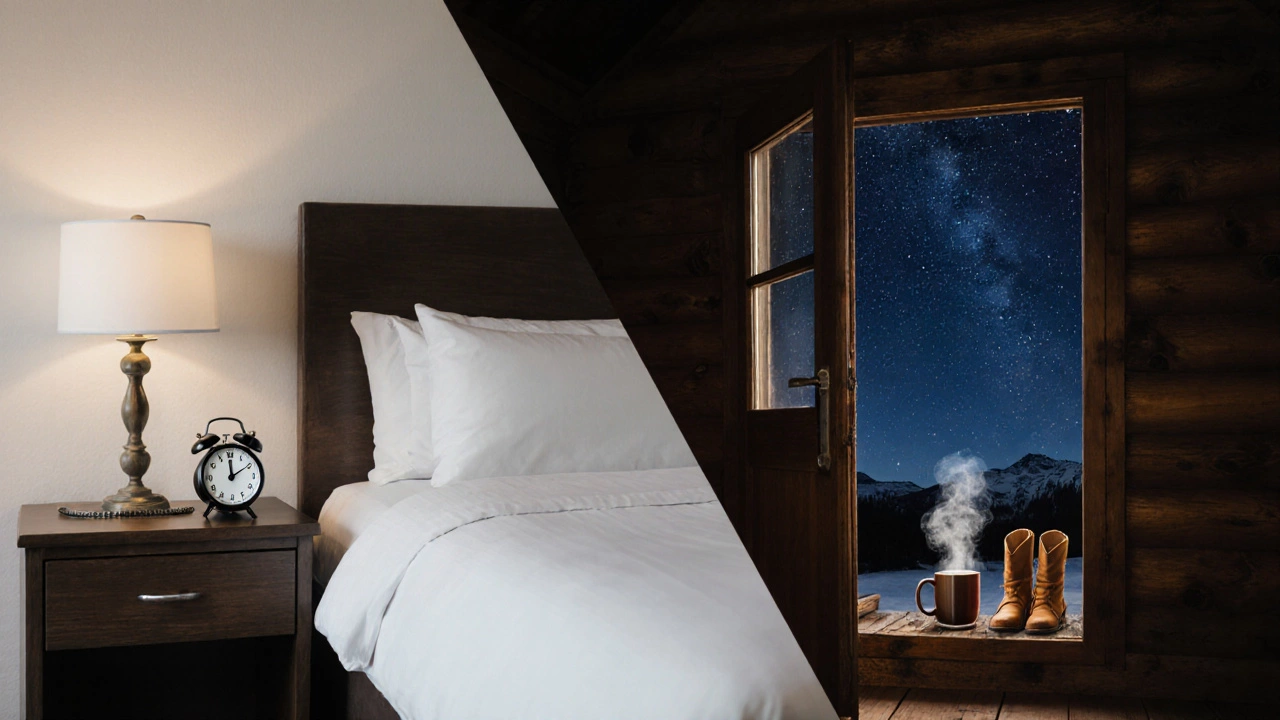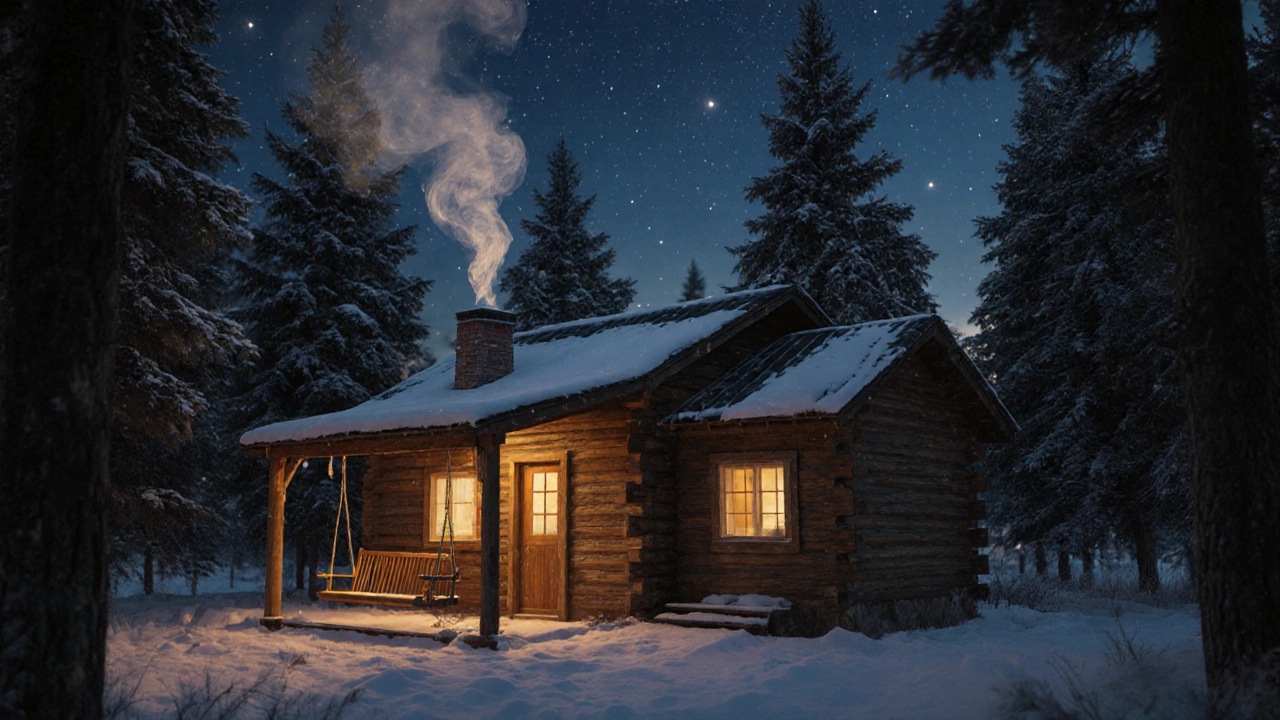Cabin vs Hotel Cost Calculator
Your Trip Details
Your Results
Real value tip: Cabins provide privacy and control that hotels simply can't match—your choice to stay up late or sleep in without guilt can be worth more than the cost difference.
Let’s be honest-most people don’t book a vacation cabin because they’re looking for a five-star hotel experience. They’re looking for quiet. For woodsmoke in the air. For a porch swing where no one calls you for three days. But with prices climbing and hidden fees piling up, the real question isn’t whether cabins are nice-it’s whether they’re worth it.
What You Actually Pay for a Cabin
That $120-a-night listing on Airbnb? That’s just the base rate. Add cleaning fees ($75-$150), service fees ($15-30%), pet fees ($25-$75), and seasonal surcharges (up to 50% during peak weekends), and you’re looking at $250-$400 for a two-night stay. Compare that to a mid-range hotel at $180 a night with no extra charges. Suddenly, the cabin doesn’t look so cheap.
But here’s what most people miss: cabins aren’t meant to compete with hotels on price. They’re meant to compete on experience. A hotel gives you a bed, a TV, and room service. A cabin gives you a kitchen, a fireplace, and a view that doesn’t change when you open the curtains. You’re not paying for a room-you’re paying for a reset.
The Hidden Value: Privacy and Control
Hotels have rules. No loud music after 10 p.m. No bringing extra guests. No cooking in the room. No letting your dog sleep on the bed. Cabins? You decide. You can cook breakfast at 8 a.m. while wearing pajamas. You can light a fire at midnight. You can leave your boots by the door and your wine bottle on the counter. That freedom? It’s priceless.
For couples, this matters more than you think. A romantic getaway isn’t about champagne and roses-it’s about being able to be yourselves. No front desk clerk watching you walk in. No elevator small talk. Just the two of you, the crackle of the fire, and the silence between you that doesn’t feel awkward-it feels like peace.
When Cabins Fall Short
Not every cabin is a dream. Some are just old sheds with a fancy name. You’ve probably seen them: photos of a perfect log cabin, but the actual listing says "20-minute walk to the nearest bathroom." Or "no hot water after 9 p.m." Or "shared driveway with three other cabins."
Red flags to watch for:
- Photos are all staged-no real shots of the interior
- Reviews mention "the Wi-Fi was slow" or "the bed was lumpy" more than once
- No mention of heating, insulation, or winter readiness if you’re going in colder months
- Host doesn’t respond to messages within 24 hours
I booked one in the Adirondacks last winter. The listing said "cozy cabin for two." Turned out it was a 1970s trailer with a space heater and a mattress on the floor. The host didn’t reply until I’d already arrived. I spent two nights shivering and eating cold canned soup. That’s the risk.

What Makes a Cabin Actually Worth It
Here’s what separates the good cabins from the ones you regret:
- Real heat-not just a space heater. Look for a wood stove or central heating with propane or electric backup.
- Good insulation-if it’s below freezing outside, you shouldn’t hear the wind whistling through the walls.
- Full kitchen-not just a microwave and a coffee maker. You want a stove, fridge, pots, and utensils.
- Clear check-in process-key lockbox, digital code, or host who meets you. No "call me when you get here" vagueness.
- Privacy-no neighbors within 50 feet, no shared common areas, no kids running past your window at 7 a.m.
These aren’t luxury features. They’re basic expectations. If a cabin doesn’t meet at least three of these, you’re better off with a hotel.
Who Gets the Most Out of a Cabin
Not everyone benefits equally. Here’s who wins:
- Couples seeking quiet-no distractions, no noise complaints, just you and your person.
- People recovering from burnout-no emails, no meetings, no notifications. A cabin forces you to unplug.
- Food lovers-you can cook real meals, buy local cheese and wine, and eat under string lights on the porch.
- Photographers or writers-natural light, quiet, and scenery that doesn’t cost extra.
Who doesn’t? Families with toddlers. People who need daily housekeeping. Anyone who hates cold showers or hiking to the bathroom. If you’re not okay with roughing it a little, a cabin might stress you out more than it relaxes you.

Where to Find the Best Cabins
Don’t just scroll through Airbnb. Try these spots:
- Bookabach (New Zealand)-clean, well-maintained, and hosts actually reply.
- Little Red Cabin (USA, Pacific Northwest)-curated collection of rustic-chic cabins with real heat and hot water. Escape to the Woods (UK, Ireland)-specializes in romantic, off-grid cabins with wood stoves and hot tubs.
- Vrbo’s "Luxury Cabins" filter-use it. Most "luxury" listings are just hotels with a porch. This filter weeds out the fakes.
I’ve stayed in over 20 cabins across Ireland, Scotland, and Canada. The ones I keep going back to? They all have one thing in common: they don’t try to be hotels. They embrace being cabins.
The Real Math: Is It Worth It?
Let’s break it down. A two-night cabin stay: $350 total. A two-night hotel stay: $360. Same price. But here’s the difference:
The hotel gives you a bed, a shower, and a continental breakfast. The cabin gives you a bed, a shower, a full kitchen, a fireplace, a view of the stars, and the freedom to stay up late or sleep in without guilt. You can make your own coffee, eat dinner on the porch, and wake up to silence instead of a noisy hallway.
That’s not just a room. That’s a reset. That’s time you can’t buy anywhere else.
So yes-vacation cabins are worth it. But only if you pick the right one. And only if you’re ready to trade convenience for connection.
Final Thought: It’s Not About the Cabin. It’s About What You Do in It.
A cabin doesn’t fix your relationship. It doesn’t erase your stress. But it creates space-for silence, for conversation, for remembering why you fell in love in the first place. It’s not a luxury. It’s a ritual. And in a world that never stops buzzing, that’s worth more than any five-star rating.
Are vacation cabins cheaper than hotels?
Not always. The base rate might be lower, but cleaning fees, service charges, and seasonal surges can push the total cost above a hotel. What cabins save you in price, they make up for in experience-privacy, space, and control over your environment.
What’s the biggest mistake people make renting a cabin?
Assuming the photos are real. Many listings use professional staging. Always read recent reviews, look for mentions of heating, hot water, and Wi-Fi, and avoid places where the host doesn’t respond quickly. If it sounds too perfect, it probably is.
Can you use a cabin for a romantic getaway in winter?
Absolutely-but only if it has proper insulation and reliable heating. A wood stove or central heating is a must. Avoid cabins that rely on space heaters or electric baseboards in cold climates. Check reviews for mentions of freezing temperatures and drafts.
Do I need to bring my own linens and towels?
Most cabins provide them, but always double-check the listing. Some rural or off-grid cabins ask guests to bring their own towels or sleeping bags. If it’s not listed, message the host before booking.
Are cabins better for couples than hotels?
For couples who value privacy and quiet, yes. Hotels are designed for efficiency. Cabins are designed for connection. No front desk, no noise complaints, no rushed check-outs-just uninterrupted time together. That’s why so many couples return to cabins year after year.
